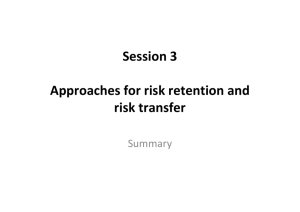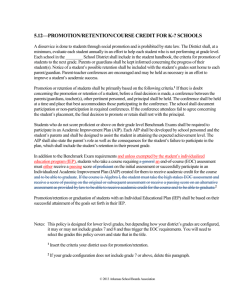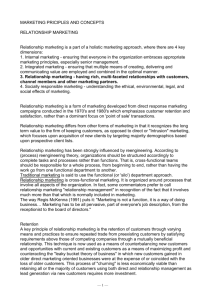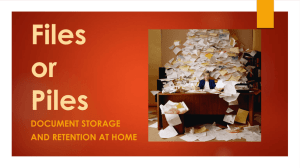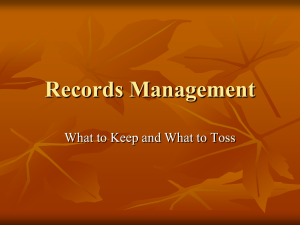Information Management 101
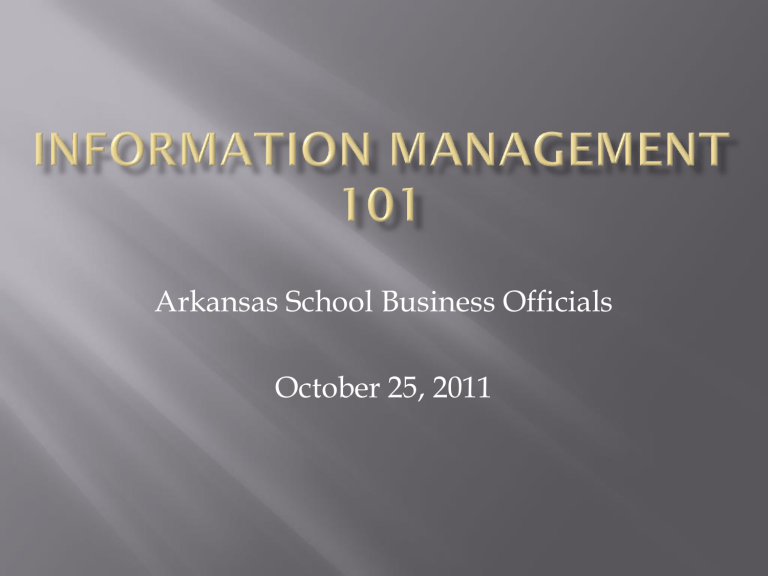
Arkansas School Business Officials
October 25, 2011
L. Freeman Wish, CPA
Clarksville School District
1701 Clark Road
Clarksville, AR 72830
479-705-3200
Freeman.Wish@csdar.org
Important to the way the school operates
Evidence of decisions, transactions, operations
School history
Strategic Planning
Archive
- A place where records of permanent value
(inactive data) are kept for legal, compliance, historical or research purposes .
Records Management Center
- A place where semi-active data are kept for legal, compliance, historical or research purposes and are accessed frequently.
Records Management
- The systematic control of recorded information from creation to final disposition.
Recorded information, regardless of medium or characteristics, received by an organization that is evidence of its operations, and has value requiring its retention for a specified period of time.
Information created, received and maintained by an organization or person in pursuance of legal obligations or in the transaction of business.
Information, often detailing business transactions, that is preserved because of the value of its data.
Correspondence
Invoices
Purchase Orders
Payroll Records
School Board Meeting Minutes
Bond Issues
Elections
Telephone Calls
Types of E-Mail
1. Non-Record Material
2. Official Records
Question: Is e-mail really a public record?
Answer: All e-mail conducted on state government computers is owned by the state of Arkansas and is a public record. Arkansas Code § 13-4-103 defines a public record as:
“… all papers, correspondence, memoranda, accounts, reports, maps, plans, photographs, sound recordings, or other documents, regardless of physical form, and which have been or shall be created or received by any agency or its lawful successor, or official thereof in the exercise of his or her office or in the conduct of any business or function pursued in accordance with law.”
Question: Who is responsible for retaining the email, the sender or recipient?
Answer: In most cases where e-mail communication is between a sender and a recipient, the sender’s copy would be designated as the official copy (copy of record). In other words, it is the sender’s copy to which any retention requirements would apply. For example, an intra agency communication is sent via email from an agency’s Personnel Office to all its employees. The copy of record would be the copy within the Personnel
Office. All other copies sent are merely “duplicates” and can be disposed of at will. Cases where this principle may not apply include email received from the public.
Personal Correspondence
Any e-mail not received or created in the course of school business, may be deleted immediately, since it is not an official record: the “Let’s do lunch” (not a school business lunch) or “Can I catch a ride home” type of note.
Other examples would include any personal messages not conveying school business.
Transient Correspondence
E-mail that is determined to have insufficient value to warrant its preservation may be deleted upon receipt.
Examples are listserve messages, announcements regarding departmental bake sales and other agency memos without legal, administrative, fiscal or historical value
Non-State Publications
Publications, promotional material from vendors, and similar materials that are “publicly available” to anyone, are not official records unless specifically incorporated into other official records.
Examples are unsolicited promotional materials (spam), files copied or downloaded from internet sites, etc.
Non-State Publications
However, for example, if you justify the purchase of a particular filing system by incorporating the reviews you saved from a listserve in your proposal to your supervisor, those listserve messages become official records and must be retained in accordance with the retention schedule for purchasing proposals.
Duplicate records are not normally considered records and do not have to be retained.
Duplicates may become the only official record if the original is destroyed or lost.
Transient Retention
Much of the communication via e-mail has a very limited administrative value and is deemed transient.
For instance, an e-mail message notifying employees of an upcoming meeting would only have value until the meeting date has been attended or the employee receiving the message has marked the date and time.
Transient Retention
The user may delete these types of e-mail messages immediately after they have served their intended purpose.
Other e-mail messages that have limited administrative value would include: telephone messages, drafts and other limited documents that serve to convey information of temporary importance in lieu of oral communication. It would only be necessary to retain these records until no longer of administrative value.
Intermediate Retention
E-mail messages that have more significant administrative, legal and/or fiscal value but are not scheduled as transient or permanent should be categorized under the appropriate record series.
Intermediate Retention
These may include (but not limited to)
General Correspondence: Includes internal correspondence (letters, memos): also, correspondence from various individuals, companies, and organizations requesting information pertaining to agency and legal interpretations and other miscellaneous inquiries.
This correspondence is informative: it does not attempt to influence agency policy.
Intermediate Retention
These may include (but not limited to)
Routine Correspondence. Referral letters, requests for routine information or publications provided to the public by the agency, which are answered by standard form letters.
Monthly and Weekly Reports: Document status of ongoing projects and issues; advising supervisors of various events and issues.
Intermediate Retention
These may include (but not limited to)
Minutes of Agency Staff Meetings: Minutes and supporting records documenting internal policy decisions.
Permanent Retention
E-mail messages and other memorandums having significant administrative, legal and/or fiscal value and are scheduled as permanent should be categorized under the appropriate record series.
Permanent Retention
These may include (but not limited to):
Executive Correspondence: Correspondence of the head of an agency dealing with significant aspects of the administration of their offices. Correspondence includes information concerning agency policies, program, fiscal and personnel matters.
Permanent Retention
These may include (but not limited to):
Department Policies and Procedures: Includes published reports, unpublished substantive reports and policy studies.
Reflect official actions taken.
Convey statements of official policy or rationale for official decisions.
File Plan Implementation
Records Retrieval
Retention and Disposition
Preservation of Significant or Historical Records
Auditing
The systematic control of all records from their creation or receipt, through processing, distribution, organization, storage and retrieval to their ultimate disposition.
Comply with Government Regulations
Reduce Legal Liability
Control Valuable Company Assets
Reduce Record Archive Size
Record
File Plan
Retention Schedule
Records Retrieval
Disposition
A system for categorizing records, divided into categories.
Each category has its own retention schedule.
All records in the system are assigned to a category.
The amount of time a record should remain in the system.
When (and if) the record should be destroyed.
How the record should be destroyed.
Structured query, full text search, or a combination of both.
Export records into their native formats.
Print or e-mail records.
Version records.
Add notes or comments to original record.
The method by which a record is removed from the system.
Disposition is based on time, event, or a combination of time and event.
The process is generally either transfer or destruction.
Not all records are permanent records.
Non-permanent records may have set retention rules.
Enforcing retention rules removes records when they become obsolete.
Example: Destroy employee personnel records seven (7) years after retirement.
Lack of a formal Arkansas School Record
Retention and Disposal Plan.
West Virginia Records Retention Schedule
Michigan Public Schools Record Retention Plan
Recommend that each school adopt a Record
Retention Plan and follow it.
19-4-1108. Retention of documents.
(a) The original evidences of indebtedness, including documents prepared in connection with purchasing procedure, and all original contracts, invoices, statements, receipts, petty cash tickets, bank statements, cancelled checks drawn upon bank accounts, and other original supporting papers shall be retained in the permanent file of the business office of each state agency. These documents shall be kept in a safe place subject to audit and shall not be destroyed until authorization is given for their destruction by the
Legislative Auditor.
(b) With the approval of the Legislative Auditor of the state, a state agency may retain evidences, to satisfy record retention policies, of indebtedness and other contracts, invoices, statements, receipts, petty cash tickets, bank statements, cancelled checks drawn upon bank accounts, and other supporting papers by microform or a form of stored images in a computer system or other form of computer technology in lieu of retaining the originals of such documents.
History. Acts 1973, No. 876, § 15; A.S.A. 1947, § 13-341; Acts 1997, No. 541, § 2; 2001,
No. 1453, § 33.
Applies to all cities, county or local governments in Arkansas
Requires the development of rules and guidelines for the retention of public records commonly found in state agencies
Requires rules and guidelines to be effective
July 1, 2007
Agency Directives,
Internal Policies and
Procedures
Keep until superseded plus three years
Meeting Agenda and
Minutes of Governing
Bodies
Permanent
Employee Benefit
Records and
Employee Personnel
Records
Workers
Compensation
Accident Reports
5 years after separation or until closure of unresolved personnel issues, whichever is greater
3 years from date of injury
Accounts Payable
Until authorized by the legislative auditor
(as required by
Arkansas Code)
Accounts Receivable
Until authorized by the legislative auditor
(as required by
Arkansas Code)
West Virginia – Audit + 3 years
Michigan – Current FY + 7 years
Arkansas – Until authorized by legislative auditor
West Virginia – Audit + 3 years
Michigan – Current FY + 7 years
Arkansas – Until authorized by legislative auditor
West Virginia – Audit + 3 years
Michigan – Current FY + 7 years
Arkansas – Until authorized by legislative auditor
West Virginia – Audit + 3 years
Michigan – Current FY + 7 years
Arkansas – Until authorized by legislative auditor
West Virginia – Permanent
Michigan – Expiration + 7 years
Arkansas – Expiration + 5 years
West Virginia – Permanent
Michigan – Permanent
Arkansas – Until the next audit report is issued by Legislative Audit
West Virginia – 50 years
Michigan – Current Fiscal Year + 50 years
Arkansas – Permanent
West Virginia – At least 4 years
Michigan – Current Fiscal Year + 1 year
Arkansas – 5 years after case closed
West Virginia – At least 4 years
Michigan – Current Fiscal Year + 7 years
Arkansas – Not Addressed in Arkansas Record
Retention Schedule
West Virginia – Not Addressed
Michigan – Current Fiscal Year + 3 years
Arkansas – Until authorized by legislative auditor
West Virginia – 25 years
Michigan – Creation Date + 6 years
Arkansas – Not Addressed in Arkansas Record
Retention Schedule
Carlucci vs. Piper Aircraft
A Piper Cheyenne crashed in Ireland – 3 men died as a result
Clara Carlucci sued Piper for design defects that caused the pilot to lose control and crash
Records were subpoenaed from Piper
2 Employees in Flight Test Department had been told by supervisor to “selectively” purge hundreds of records that might be detrimental to
Piper in future lawsuits.
Piper claimed these records were destroyed under retention procedures
Piper could not demonstrate that these procedures were in place or that they were being followed.
Judge entered default judgment against Piper for
$10 million – for selective destruction of records.
Judge did not even consider merits of case
Milestone decision about destruction of records – courts will not tolerate selective destruction of records
Major Issue – Piper could not document to the court that it destroyed its records in the regular course under an approved records retention schedule
After a 6-week trial and 10 days of deliberation, a jury found Arthur Andersen guilty of obstruction of justice when it destroyed Enron
Corp. documents while on notice of a federal investigation by the SEC.
The jury rejected Arthur Andersen’s defense that the documents were destroyed as part of its housekeeping duties and not as a ruse to keep Enron documents away from the regulators.
Arthur Andersen received the maximum sentence of 5 years probation and a $500,000 fine.
35,000 people lost their jobs worldwide.
Since the initial court decision, the Anderson
Case was reversed but it was too late to save the company
The lesson to be learned from the Arthur
Andersen experience is that a Document
Retention Program, an otherwise critical part of a company’s risk management program, will not save you from sanction if the policy does not conform to law, either in content or in implementation.
Records and information are the key component to the existence of any organization.
Good record keeping processes and policies are imperative.
Litigation issues.
What happens if the organization ceases to exist?
If a record retention policy
Is reasonable, has a genuine business purpose and establishes appropriate retention periods
Is not selective – it wasn’t designed to destroy all records quickly so that nothing would be available if anyone should ever sue the organization or commence an investigation
Is implemented in an evenhanded manner by employees who understand the policy
Provides for prompt cessation of destruction programs if and when the organization learns of an investigation or litigation
Then
A company should not incur criminal liability for an innocent failure to retain potential evidence.
The Arkansas General Records Retention
Schedule http://www.dfa.arkansas.gov/offices/intergovernme ntalServices/Documents/rec_retention_schedule.pdf
The Arkansas General Records Retention
Schedule
Questions and Answers http://www.dfa.arkansas.gov/offices/intergovernmental
Services/Documents/retention_faq.pdf
West Virginia Public School Records Retention
Schedule http://wvde.state.wv.us/finance/manuals/re cordretentionschedule.pdf
General Retention Schedule #2
Michigan Public Schools http://www.michigan.gov/dmb/0,4568,7-
150-9141_21738_31548-62562--,00.html
